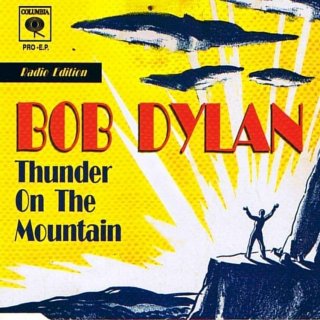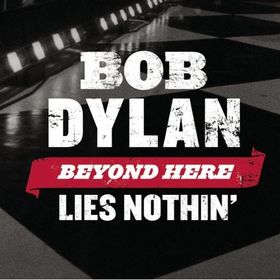Related Research Articles

World Gone Wrong is the twenty-ninth studio album by American singer-songwriter Bob Dylan, released on October 26, 1993, by Columbia Records.
"Talkin' World War III Blues" is a song written and performed by the American singer-songwriter Bob Dylan that was first released as the tenth track of his 1963 album The Freewheelin' Bob Dylan. Like nearly every song on the album, it is performed by Dylan solo, accompanying himself on acoustic guitar and harmonica played in a rack.
"Spirit on the Water" is a love ballad written and performed by the American singer-songwriter Bob Dylan, released in 2006 as the second track on his album Modern Times. The title is a reference to a passage in the Book of Genesis. It is notable for being the only song on Modern Times to feature a harmonica solo. As with much of Dylan's 21st-century output, he produced the song himself under the pseudonym Jack Frost.
"When the Deal Goes Down" is a love song written and performed by American singer-songwriter Bob Dylan, originally released as the fourth track on his 2006 album Modern Times and anthologized on the compilation albums Dylan in 2007 and reissues of The Essential Bob Dylan beginning in 2010. As with much of Dylan's 21st-century output, he produced the song himself under the pseudonym Jack Frost.
"Nettie Moore" is a folk love song written and performed by American singer-songwriter Bob Dylan, released in 2006 as the eighth track on his album Modern Times. As with much of Dylan's 21st-century output, he produced the song himself under the pseudonym Jack Frost.
"Sugar Baby" is a song written and performed by the American singer-songwriter Bob Dylan, released in 2001 as the 12th and final track on his album Love and Theft. Like most of Dylan's 21st century output, he produced the song himself under the pseudonym Jack Frost.
"High Water " is a song written and performed by the American singer-songwriter Bob Dylan, released as the seventh track on his 31st studio album "Love and Theft" in 2001 and anthologized on the compilation album Dylan in 2007. Like much of Dylan's 21st century output, he produced the track himself under the pseudonym Jack Frost.

"Thunder on the Mountain" is a song written and performed by American singer-songwriter Bob Dylan, released in 2006 as the first track on his album Modern Times. Like much of Dylan's 21st century output, he produced the song himself under the pseudonym Jack Frost.
"Workingman's Blues #2" is a song written and performed by American singer-songwriter Bob Dylan, released as the sixth track on his 2006 album Modern Times. As with much of Dylan's 21st-century output, he produced the song himself under the pseudonym Jack Frost.
"You're a Big Girl Now" is a song by Bob Dylan, released on his 15th studio album, Blood on the Tracks, in 1975. It is one of five songs on the album that Dylan initially recorded in New York City in September 1974 and then re-recorded in Minneapolis in December that year. The latter recording, made on December 27, 1974, became the album track.
"Summer Days" is an uptempo twelve-bar blues/rockabilly song written and performed by American singer-songwriter Bob Dylan that appears as the third song on his 2001 album Love and Theft. It was anthologized on the compilation album The Best of Bob Dylan in 2005. Like most of Dylan's 21st century output, he produced the song himself under the pseudonym Jack Frost.

"Beyond Here Lies Nothin' " is a song written by American singer-songwriter Bob Dylan and performed by Dylan as the opening track on his 2009 studio album Together Through Life. The title is a quote from the ancient Roman poet Ovid. The track was available as a free download on Dylan's official website from March 30 to March 31, 2009, and a photo montage set to the song premiered on Amazon on April 21. It has been anthologized on every reissue of The Essential Bob Dylan since 2010. Like much of Dylan's 21st century output, he produced the song himself using the pseudonym Jack Frost.

"Everything is Broken" is an uptempo rock song written and recorded by American singer-songwriter Bob Dylan, and released as the first single from his 1989 album Oh Mercy, where it appears as the third track. It was later anthologized on the compilation albums The Essential Bob Dylan in 2000 and Dylan in 2007. The song spent eight weeks on Billboard's "Mainstream Rock Songs" chart, peaking at number eight on October 27, 1989. It was produced by Daniel Lanois.
"Forgetful Heart" is a minor-key blues song written by American singer-songwriter Bob Dylan that appears as the fifth track on Dylan's 2009 studio album Together Through Life. Like much of Dylan's 21st century output, he produced the song himself using the pseudonym Jack Frost.

"Silvio" is a folk rock song written by Bob Dylan and Robert Hunter and released by Dylan as the seventh track of his 1988 album Down in the Groove. Performed alongside the Grateful Dead, the song was released as the album's only single and spent eight weeks on Billboard's Mainstream Rock chart, peaking at #5 on July 1, 1988.
"Roll On John" is a song written and performed by American singer-songwriter Bob Dylan that appears as the tenth and final track on his 2012 studio album Tempest. Like much of Dylan's 21st-century output, he produced the song himself using the pseudonym Jack Frost.
"Lonesome Day Blues" is a twelve-bar blues song written and performed by Bob Dylan that appears as the fifth song on his 2001 album Love and Theft. Like most of Dylan's 21st century output, he produced the song himself under the pseudonym Jack Frost.
"Ring Them Bells" is a song written and performed by American singer-songwriter Bob Dylan, released in 1989 as the fourth track on his album Oh Mercy. It is a piano-driven, hymn-like ballad that is considered by many to be the best song on Oh Mercy and it is the track from that album that has been covered the most by other artists.
"Crossing the Rubicon" is a song written and performed by the American singer-songwriter Bob Dylan and released as the eighth track on his 2020 album Rough and Rowdy Ways. It is a slow electric blues featuring lyrics that heavily reference classical antiquity and the life of Julius Caesar in particular.
"Po' Boy" is an acoustic folk/jazz song written and performed by American singer-songwriter Bob Dylan that appears as the tenth song on his 2001 album Love and Theft. It was anthologized on the compilation album Dylan in 2007. Like most of Dylan's 21st century output, he produced the song himself under the pseudonym Jack Frost.
References
- ↑ "Bill Flanagan – "Interview with Bob Dylan – Part 6" (2009)". The Beat Patrol. 2009-04-26. Retrieved 2021-05-29.
- ↑ Margotin, Philippe; Jean-Michel Guesdon (2015). Bob Dylan : all the songs : the story behind every track (First ed.). New York. ISBN 978-1-57912-985-9. OCLC 869908038.
{{cite book}}: CS1 maint: location missing publisher (link) - ↑ "It's All Good | The Official Bob Dylan Site". www.bobdylan.com. Retrieved 2021-09-01.
- ↑ Mead, Rebecca (4 June 2001). ""It's All Good"". The New Yorker. Retrieved 2021-01-01.
- ↑ Dolan, Jon; Doyle, Patrick; Greene, Andy; Hiatt, Brian; Martoccio, Angie; Sheffield, Rob; Shteamer, Hank; Vozick-Levinson, Simon (2020-06-18). "The 25 Best Bob Dylan Songs of the 21st Century". Rolling Stone. Retrieved 2020-12-20.
- ↑ "Bob Dylan: Together Through Life". pastemagazine.com. 2009-04-28. Retrieved 2021-05-30.
- ↑ Together Through Life - Bob Dylan | Songs, Reviews, Credits | AllMusic , retrieved 2021-06-03
- ↑ Whatman, Aidan (2021-05-22). "Every Bob Dylan Album Ranked Worst To Best". WhatCulture.com. Retrieved 2021-05-22.
- ↑ "Elliott Murphy's Top 10 Bob Dylan Tracks – 21st Century". Poetic Justice. 2023-12-05. Retrieved 2023-12-07.
- ↑ "Hamlet Soliloquy: O, what a rogue and peasant slave am I! (2.2) with annotations". www.shakespeare-online.com. Retrieved 2020-12-20.
- ↑ "'My Own Love Song' Soundtrack Features 16 New Bob Dylan Songs". theplaylist.net. Retrieved 2020-12-20.
- ↑ "Bob Dylan Tour Statistics | setlist.fm". www.setlist.fm. Retrieved 2020-12-20.
- ↑ "Setlists | The Official Bob Dylan Site". www.bobdylan.com. Retrieved 2021-05-30.